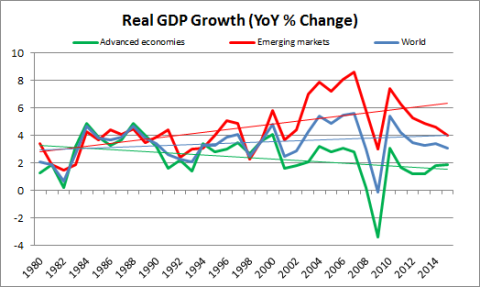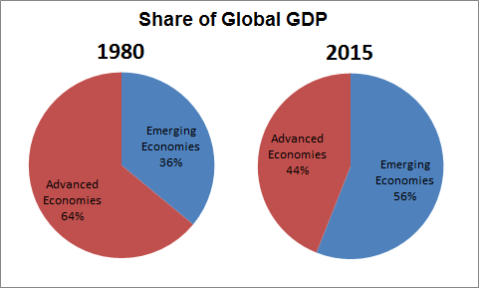Did you know that world growth rates have actually picked up since 1980? Did you know that emerging market growth rates have averaged 4.5% since 1980? You might not know it from the media’s coverage of “secular stagnation”, but global growth isn’t slowing. Secular stagnation is only a thing in the advanced economies of the world where growth has slowed. As you can see in the following chart the trend-line growth for global real GDP has edged marginally higher since 1980 while emerging markets have advanced strongly and advanced economies have weakened:
(Source: IMF)
So, all that’s happening here is that the advanced economies are losing market share to the emerging market economies. Yes, “secular stagnation” is really a thing at the advanced economy level, but it’s not a thing in the aggregate because the loss of market share has been the gain of the emerging world during a period of modest growth. This explains why emerging market living standards have boomed while advanced economies are experiencing a more imbalanced advance in living standards.
But another important point here is that this shouldn’t really be shocking to anyone. The advanced economies of the world had grown to become such a significant portion of the global economy that some loss in market share was likely inevitable. As of 1980 advanced economies were responsible for 64% of global growth. That figure has nearly flip flopped over the last 35 years:
None of this means that we couldn’t be doing more to avoid the deterioration in advanced economy economic growth. I think policy has been less than optimal for the last few decades. But this does shed some important light on the topic as it highlights the fact that much of this “stagnation” in advanced economies was beyond the control of policymakers. Combine this with other substantial trends like demographics and we can chalk the secular stagnation up to relatively natural processes occurring inside of the global economy.
Mr. Roche is the Founder and Chief Investment Officer of Discipline Funds.Discipline Funds is a low fee financial advisory firm with a focus on helping people be more disciplined with their finances.
He is also the author of Pragmatic Capitalism: What Every Investor Needs to Understand About Money and Finance, Understanding the Modern Monetary System and Understanding Modern Portfolio Construction.




